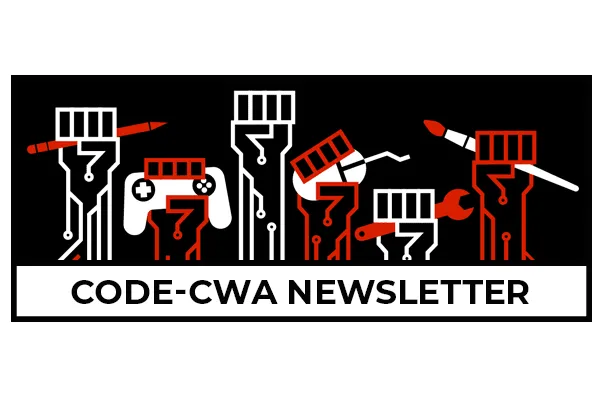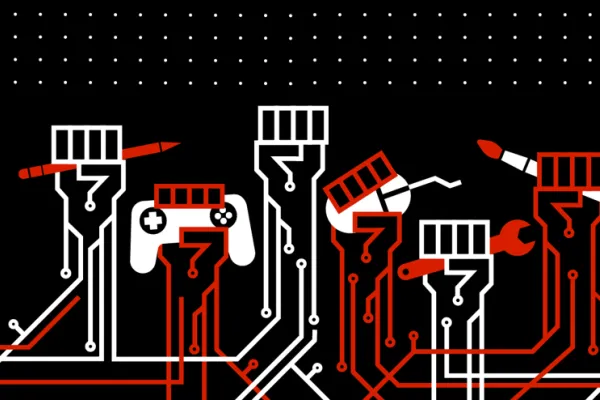CODE-CWA Newsletter: April 23

CODE-CWA Newsletter: April 23
‘Unionizing is the only way to introduce a democratic process in your workplace, to kind of get a seat at the table with people in charge.”
—Senior software engineer Nozlee Samadzade at the New York Times
The biggest tech unionization effort is happening at the New York Times where 700 tech workers—the back bone of the newspaper’s digital power, have voted to unionize as the New York TImes Tech Guild with CWA. Unfortunately management made the hypocritical choice to ignore their workers’ democratic decision to unionize, by refusing to voluntarily recognize the union and instead push workers through an unnecessary National Labor Relations Board process. The New York Times has voluntarily recognized unionized workers in the past, and the editorial board has previously supported voluntary recognition. Yet workers will not be swayed and continue to organize to win voluntary recognition.
Pinterest whistleblower, Ifeoma Ozoma, wrote an op-ed about the California bill she co-sponsored, Silenced No More Act, could expand whistleblower protections and roll back the power of nondisclosure agreements. Hours after Ozomo published her NYTimes Op-ed announcing the Pinterest CEO Ben Silbermann emailed his staff to express support for the bill and announced that the company is adopting policies behind the law, whether it goes forward or not. We don’t know how this is going to pan out and if the devil will be hidden in details of Pinterest’s new NDA policies, but we know that tech companies are beginning to respond to employee outrage.
Well some companies. Amazon and its affiliates continue to drag its feet on workers rights. The labor movement suffered a setback earlier in April, when Amazon warehouse workers in Alabama voted not to join a union. However, the experience of unionized employees at Pittsburgh’s Google office suggests the fight might not have ended even if the Alabama workers had voted "yes." Details about that and more in this newsletter.
Union organizing and conversations around unfair and exploitative practices are picking up steam in the tech industry. In this newsletter, we give you the latest on the threats to tech employees and tech organizing. Through our support of workers across the tech, games, and digital industries we have seen a cultural shift as workers turn to each other to bring the change they seek. This commitment to building democracy in the workplace will impact all of us. Are you looking to organize your workplace? Reach out. We are ready to organize with you.
Events
On April 24, at 12PM PST join our class on “Building the Committee.” In this class we talk about how to build a strong organizing committee, maintain it, and build a strong foundation from which you can run a successful union campaign. Sign up here. On April 25, at 12pm PST you can also join our class “Intro to Unions and Organizing”In this class we talk about the union basics, the CWA organizing models, and some key ways to connect with co-workers through organizing conversations. Sign up here
Both classes are Class 1 in a series, perfect for beginners.Training is active and participatory. We do not let anyone join more than 10 minutes late.
Worker News
The Biggest Tech Unionization Effort Is Happening at the New York Times The company didn’t have a website 30 years ago. Now, the New York Times employs more than 700 tech workers, half its number of journalists. On April 13, these tech workers announced they want to form a union with CWA. Almost half the Times is already unionized, including most of the journalists, along with the newspaper printers. Now, the tech workers want to join the journalists in their union, The NewsGuild. Senior software engineer Nozlee Samadzadeh helps build the internal site for Times journalists to compose and edit their stories. She got into tech after working as a writer and editor herself. Samadzadeh says it’s important for her to have a say in what she builds and how it is used. “Unionizing is the only way to introduce a democratic process in your workplace, to kind of get a seat at the table with people in charge.” Read more about this powerful show of tech worker solidarity on KQED.
Google Contract Workers In Pittsburgh Are Still Waiting For Their Labor Contract
It’s been 18 months since Pittsburgh workers who were believed to become the first white-collar employees to organize while doing work for a major tech firm. But they still don’t have a labor contract.The roughly 65 union members work for a Google contractor, called HCL America. They work on the Google Shopping platform alongside permanent employees at the tech giant’s office. In September 2019, HCL employees voted to affiliate with the United Steelworkers union by a two-to-one margin. But not much has happened since then. HCL analyst and union organizer Ben Gwin said HCL is slow-walking contract negotiations. “They’re not willing to meet more than twice a month. It's insulting," Gwin said. Last fall, the National Labor Relations Board, which handles complaints about unfair labor practices, charged HCL with failing to bargain in good faith. A hearing had been scheduled for April, but it’s been postponed until June 8. Read or listen to the full story on NPR affiliate 90.5 WESA’s site.
Google Turmoil Exposes Cracks Long in Making for Top AI Watchdog
In December 2020, the division's leadership began to collapse after the contentious exit of prominent Black researcher Timnit Gebru over a paper the company saw as critical of its own artificial intelligence technology. To outsiders, the decision undermined the very ideals the group was trying to uphold. To insiders, this promising ethical AI effort had already been running aground for at least two years, mired in previously unreported disputes over the way Google handles allegations of harassment, racism and sexism, according to more than a dozen current and former employees and AI academic researchers. Read more on Bloomberg.
Pinterest Whistleblower Talks About the California Bill She Co-sponsored
Ifeoma Ozoma’s Silenced No More Act, could expand whistleblower protections and roll back the power of nondisclosure agreements. The bill breezed through committee this week, and Ozoma was back in the news with a New York Times op-ed titled An NDA Was Designed to Keep Me Quiet where she pleaded the need to end gag orders for victims of workplace abuse. Listen to her speak to Google walkout veteran Claire Stapleton in the Techworker podcast.Global South startups can do better than Silicon Valley
Silicon Valley’s brand of thinking –– fixated on technology as a solution, bolstered by exploitative labor practices, marked by a narrow definition of innovation –– should be a cautionary tale, not a model to follow. Platforms constantly take on different personas as they move to different markets. In Pakistan, the people wealthy enough to own cars are unwilling to drive them for profit so they hire drivers to work 12-hour shifts for minimum wage. In South Africa, violent clashes between taxis and Uber drivers forced Uber to deploy armed private security in demand hotspots. “The story of technology, many forget, is not just about the app or the algorithm, but also the context,” Rida Qadri writes. Read more on the Rest of the World.
New Research Explores COVID’s Impact on Gig Workers in France
New research from French university INSEAD explores what life has been like for gig workers during the pandemic. Covid had a profound impact on the lives of the participants, with 56% of them reporting that they had stopped working as a result of the lockdown measures introduced by the French government. Even with state support, they revealed that their income had fallen by 28% on average. When the workers were first spoken to, their average monthly income was just over €1,750 per month, with around a third of them earning below €1,000 per month. This would place them below the official poverty line in France, which is defined by the European Union as €1,065 per month. This was especially so for bicycle couriers, who brought in an average of just €923 each month. Read more on Forbes.
Opinion: When It Comes to Big Tech, Focus Should Be Workers
Recently, Senator Josh Hawley introduced two bills geared at addressing antitrust concerns when it comes to Big Tech. And President Biden's pick for commissioner of the Federal Trade Commission, Lina Khan, is a noted advocate of using antitrust against Big Tech companies. Khan's appointment would represent a watershed moment for reigning in Big Tech. And she is not alone; with fellow antitrust advocate Tim Wu's appointment to the National Economic Council, the Biden administration is clearly signaling an openness to applying antitrust law against Big Tech. But Jake Pitre writes, “The problem is, Big Tech's real problem is not antitrust. It's the exploitation of its laborers. And in locating the fight against Google and Amazon as one over monopolies, these well-intentioned critics are missing the point and obfuscating the true problem.” Read more from Jake Pitre on Newsweek.com.
This Week in Labor History
April 21, 1967: That was the day the Taylor Law went into effect in New York State. It was celebrated for granting public employees the right to organize and elect union representation. But it is also roundly criticized for stripping public sector workers of their right to strike. It was crafted and enacted in response to the militant, victorious New York City transit strike of January 1966. More here.
Song of the Week
More Than a Paycheck—Originally by Sweet Honey in the Rock
I wanted more pay.
But what I’ve got today
is more than I bargained for
when I walked through that door.
I bring home asbestosis, silicosis, brown lung, black lung disease.
And radiation hits the children before they’ve even been conceived.
So I say – Workers lend an ear.
It’s important that you know.
With every job there is a fear that disease will take its toll.
If not disease, then injury may befall your lot.
If not injury, then stress is going to tie you up in knots.
We bring more than a paycheck to our loved ones and family.
CODE-CWA Newsletter: February 21, 2025

